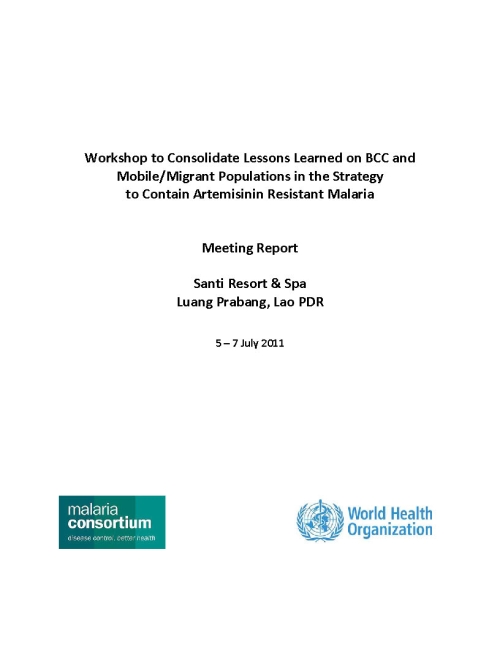
Publication Date:
05/07/2011
Type:
Project report

Workshop to consolidate lessons learned on BCC and mobile/migrant populations in the strategy to contain artemisinin resistant malaria
Publication Date:05/07/2011
Type:
Project report
BCC and IEC interventions play a key role in reducing the incidence of malaria. In both Thailand and Cambodia, a number of innovative approaches have been developed targeting mobile and migrant populations. Strong collaboration between Cambodia and Thailand has resulted in coordinated and harmonized BCC and IEC materials, developed in Khmer and Thai. Both national programmes make use of a diversity of media including television, radio and SMS (short messaging services) messages via phones, as well as more traditional tools such as billboards, posters and stickers. In Cambodia, an innovative pilot scheme using taxi drivers as health educators and messengers of BCC has been piloted in Battambang province with positive results. Taxi drivers receive basic training in health education and are provided with a range of BBC/IEC materials to distribute to passengers.
Further to these innovative approaches to programming, the Response Driven Sampling method (RDS) was also piloted in Cambodia and Thailand as a methodological tool to provide situational assessments of migrant communities. The RDS method has been instrumental in helping to characterize the movements, care seeking and personal protection practices of migrant and mobile populations, as well as identifying potential points of access. The results of the RDS studies can be used to develop action plans to better target and access migrant populations with malaria prevention and treatment interventions and increased surveillance to limit the spread of artemisinin resistant malaria parasites.
Country: Cambodia | Thailand
Keywords: Capacity development | Surveillance | SBC | Policy development | Malaria | Elimination | Resistance management
Diseases: Malaria
« Back to Publications